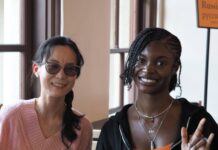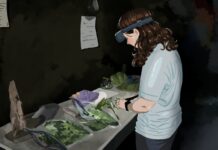Residential Education (ResEd) recently added a question to the Roommate Questionnaire, sent to next year’s incoming first-years, in order to accommodate roommate preferences related to gender and sexual identity.
The question asks: “Do you identify as lesbian, gay, bisexual, pansexual, queer, asexual, transgender/transsexual, intersex, or as a committed ally? If you are comfortable being ‘out’ on this form, this is an excellent area to speak about your housing needs.”
ResEd uses this questionnaire to ensure first-year roommate pairs are as compatible as possible. It includes questions ranging from personal interests to academic habits, and now gender identity and sexuality.
Although early decision students—about 20 to 25 percent of students admitted—have already received the forms, the additional question appeared on the remaining 75 percent of questionnaires.
Associate Dean of Students Tim Chang first met with Queer Student Alliance (QSA) restoration committee members April 7 to get a sense of how the college can better support queer students.
According to Chang, the committee requested adding an option for students to identify as queer or as active allies and the option to live with other queer or committed ally students.
QSA President Myell Mergaert (senior) credited the new survey option to QSA’s recent involvement with ResEd.
“I feel like the conversation hadn’t necessarily materialized in a very effective way. We never were really like, ‘Can we just change this form?'” Mergaert said. “We didn’t have an actual demand, or tangible thing they could actually do, so we gave them something to actually do.”
Chad Meyers, director of Residential Education and Housing Services, noted that this change was also requested in a discussion between ResEd and the staff of the Intercultural Community Center last year.
Meyers hopes that adding this new question to the form will allow future first-year students to be placed into safer living environments.
“Once I heard from QSA that some incoming students were not feeling safe in their own rooms, their home away from home, I knew that we needed to take action,” Meyers said via email. “I hope that just by having the question on the questionnaire incoming students will know that Oxy is a caring and supportive space, and hopefully that will allow them to be active and contributing members of the Oxy community from day one on campus.”
QSA member Alexis Morse (first-year) acknowledges that randomly assigned first-year housing situations can be opportunities to meet new people and learn something new. Yet, she notes that when a member of the queer community shares a room with someone, there can be undue burden on that person to educate their roommates on how to create an inclusive space.
“We’re not trying to imply that just because someone doesn’t identify as an ally that they are a bad person,” Morse. “All we’re doing is giving students who are coming in, who are nervous and scared, a choice to feel safer. It’s a statement.”
Members of the QSA executive board remarked on how quick the process was—it took less than four days for the added question to go from conversation to actualization. After Chang and Myers heard that the QSA recommended this change, they reviewed the language with the QSA members and passed the updated version along to admissions.
“It was actually pretty simple,” Chang said via email. “We think that this additional question will give us more information which will assist us in paring roommates together who are more compatible.”
According to Morse, this additional question will reaffirm Occidental’s commitment to providing a culture of care.
“Instead of just saying, ‘Oh, we’re a liberal school so we’re are accepting of queer people,’ its saying ‘We’re liberal, and we are actively going to be accepting, accommodating and supportive,” Morse said.
Mergaert believes that the inclusion of the term ‘ally’ in this addendum will necessitate further campus discussion about what it really means to be an ally.
“People will self-identify as whatever they want to identify as. People might have one perception of what something is, like ally-ship, but they may not do what you actually need to do to create a supportive environment,” Mergaert said.
Morse has already observed the positive effects of this change through Facebook conversations with queer students of the class of 2019. Morse recently told an incoming student about the option to self-identify and the prospect of being paired with a self-identified ally roommate, and received positive feedback and relief from queer students concerned about their safety in residence halls.
![]()





























